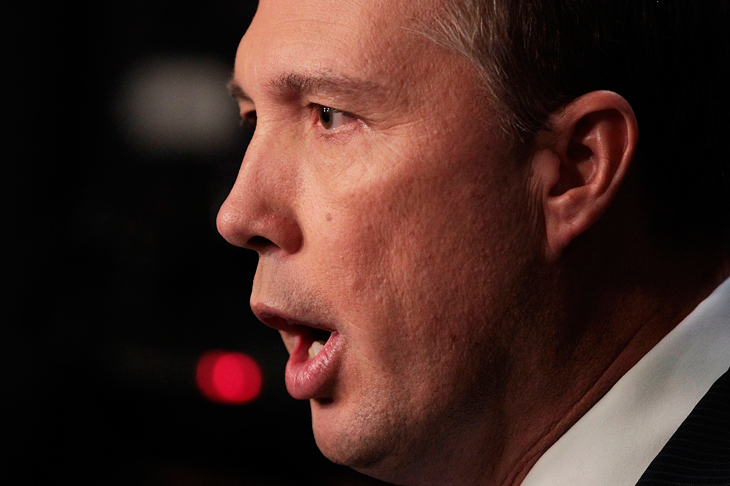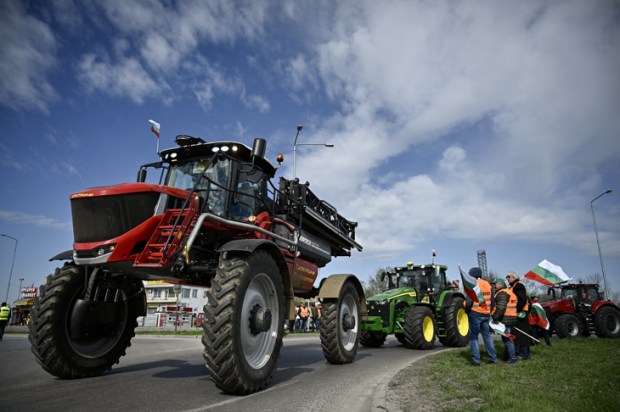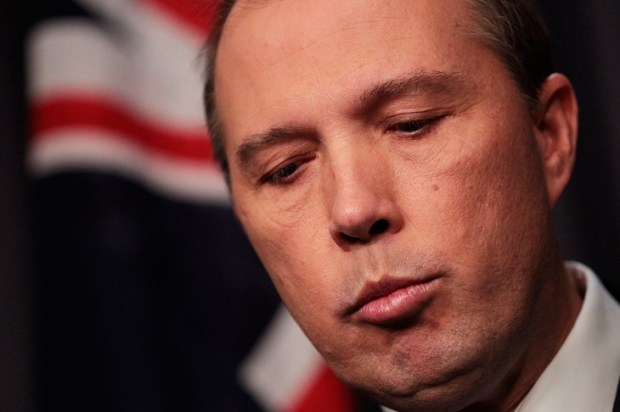In a characteristically pungent Speccie piece, Rod Liddle recently described as ‘genocide’ the situation of white farmers in the semi-arid region of the South African Karoo, (‘Genocide in South Africa’). I don’t know if Peter Dutton has time to read The Spectator Australia, but shortly after Liddle’s jeremiad was published, our work experience minister for almost everything, had a brilliant idea. Let’s create a special visa to bring out the white farmers before they are all murdered by the rampaging hordes of disaffected blacks.
Mr Dutton didn’t quite pitch his inspirational concept in those terms but it took a nanosecond for the Left to pounce. Amy Reikis in the Guardian made the point that there are more black people being murdered than whites… a lot more. So why give special treatment to the white farmers who have exploited the toiling masses for centuries? What Amy didn’t mention is that the black South Africans are being murdered in ever-increasing numbers not because they are black, but because of the rising crime rates following the collapse of the racist, white supremacist government which introduced apartheid. The white farmers are being murdered because they are white. The usual suspects from the Left also jumped on the ‘let’s get Dutton bandwagon’ while conservatives including Tony Abbott and Andrew Bolt leapt to his defence.
But Amy’s point has some weight. If we are to make a special case for farmers who are being thrown off their land because a numerically-stronger population wants that land then what should we do about the Rohingya Muslims who have recently had to leave Myanmar for more or less the same reasons as the white farmers from South Africa who are currently searching for alternative places to farm. There are almost one million destitute Muslims currently residing in flood prone wastelands of Bangladesh who have been described as ‘the worlds most persecuted minority’. So why give a few thousand white farmers in South Africa special treatment when Rohingya farmers have endured unspeakable atrocities at the hand of the Myanmar military?
One of the problems with the left/right ideological divide is that it predisposes people to adopt predetermined positions in response to a new idea regardless of its merits. Dutton’s ham- fisted suggestion about giving special consideration to white South African farmers was shot down before anyone could give it the consideration it deserved. Turnbull and Bishop were anxious to strangle it at birth because they correctly saw what the Greens would do with the idea of importing white South African farmers at the expense of the downtrodden masses languishing in our offshore detention centres.
But there is an argument relating to the white South African farmers which is at least worthy of serious, dispassionate consideration. Brad Thompson recently outlined the challenges faced by the farming industry due to labour shortages in rural areas (‘Australians say no to farm jobs’, AFR).
In modern industrial societies most people prefer to live in large cities rather than rural communities and rural depopulation has been progressing for over a century. The mechanisation of agriculture, declining commodity prices, and greater economic opportunities in cities are only some of the reasons for this continuing shift in the demographic structure of Western societies.
And this is why Dutton’s idea is not an absolute stinker. Like the Karoo, Australia has a lot of semi-arid land of marginal economic value. It is not the sort of land one would farm if there was a choice and the white farmers in the Karoo are there for exactly that reason. They have no choice. But they have successfully developed this region because, as Rod Liddle so delicately puts it ‘when it comes to farming and modernity they are extremely competent. Racist and competent, while the blacks were racist and hilariously incompetent.’.
Throughout Australia there are millions of acres of semi-arid empty land which is not being used for any agriculture. Most cannot compete with more fertile land closer to domestic markets. Often the only people living in in these regions are Aborigines in remote settlements which have no economic connection to the rest of Australia. The irony is that Australia is operating a system of Apartheid which is not entirely dissimilar to the former South African system.
Despite the fact that the remote settlements are surrounded by vast amounts of empty land, there is generally no attempt made to use the land to grow food or rear livestock for the community. Instead, frozen or tinned food is imported at great cost from main cities which are often several hundred kilometers away.
The recent suggestion that some of the remote communities be closed was met with howls of outrage by the Aboriginal industry spokespersons, most of whom wouldn’t ever visit, let alone live in such outposts of civilisation. And so these third world communities linger on, sustained by just enough sit-down money to keep the occupants in tinned, precooked meals and cigarettes.
By any objective analysis, most of these communities are an economic and social disaster and it is time that a new approach was tried.
In Papua New Guinea, agricultural development officers travelled around remote villages introducing new techniques to neolithic tribesmen. Perhaps a similar approach is required here.
Agricultural experts could be given the job of making remote communities self-sufficient in food. The members of the communities should be told that, if they failed to achieve self-sufficiency within that time, then the community would be denied any additional economic assistance. The South African farmers could be given the task of guiding the community leaders towards agricultural self-sufficiency and from there to market gardening.
Already I can hear the howls of confected outrage from the Left. Bringing in redneck South Africans and threatening traditional communities with closure is a denial of someone’s human rights, etc. But if we could drop our left/right fixed positions and step out of the trenches for a moment, we might recognise that Dutton’s thought bubble represents an opportunity worthy of consideration.
For over 40 years everyone has agreed that something must be done about the remote Aboriginal communities. Unless a new approach is introduced in these forlorn outposts, in 40 years time everyone will still agree that something must be done about remote Aboriginal communities.
Got something to add? Join the discussion and comment below.
Get 10 issues for just $10
Subscribe to The Spectator Australia today for the next 10 magazine issues, plus full online access, for just $10.
You might disagree with half of it, but you’ll enjoy reading all of it. Try your first month for free, then just $2 a week for the remainder of your first year.














Comments
Don't miss out
Join the conversation with other Spectator Australia readers. Subscribe to leave a comment.
SUBSCRIBEAlready a subscriber? Log in